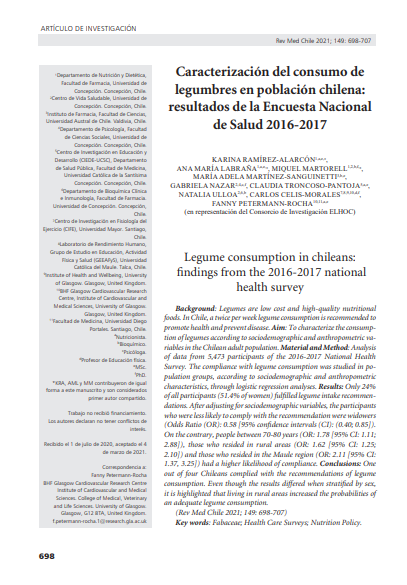Caracterización del consumo de legumbres en población chilena: resultados de la Encuesta Nacional de Salud 2016-2017

Fecha
2021-05Autor
Ramírez-Alarcón, Karina
Labraña, Ana María
Martorell, Miquel
Martínez-Sanguinetti, Maria Adela
Nazar, Gabriela
Troncoso-Pantoja, Claudia
Ulloa, Natalia
Celis-Morales, Carlos [Univ Mayor, Ctr Invest Fisiol Ejercicio CIFE, Chile]
Petermann-Rocha, Fanny
Ubicación geográfica
Notas
HERRAMIENTAS
Acceda a títulos restringidos
¿Cómo descargar?Resumen
Background: Legumes are low cost and high-quality nutritional foods. In Chile, a twice per week legume consumption is recommended to promote health and prevent disease. Aim: To characterize the consumption of legumes according to sociodemographic and anthropometric variables in the Chilean adult population. Material and Method: Analysis of data from 5,473 participants of the 2016-2017 National Health Survey. The compliance with legume consumption was studied in population groups, according to sociodemographic and anthropometric characteristics, through logistic regression analyses. Results: Only 24% of all participants (51.4% of women) fulfilled legume intake recommendations. After adjusting for sociodemographic variables, the participants who were less likely to comply with the recommendation were widowers (Odds Ratio (OR): 0.58 [95% confidence intervals (CI): (0.40; 0.85]). On the contrary, people between 70-80 years (OR: 1.78 [95% CI: 1.11; 2.88]), those who resided in rural areas (OR: 1.62 [95% CI: 1.25; 2.10]) and those who resided in the Maule region (OR: 2.11 [95% CI: 1.37, 3.25]) had a higher likelihood of compliance. Conclusions: One out of four Chileans complied with the recommendations of legume consumption. Even though the results differed when stratified by sex, it is highlighted that living in rural areas increased the probabilities of an adequate legume consumption.
URI
https://repositorio.umayor.cl/xmlui/handle/sibum/9279https://www.scielo.cl/pdf/rmc/v149n5/0717-6163-rmc-149-05-0698.pdf
http://dx.doi.org/10.4067/s0034-98872021000500698
Coleccion/es a la/s que pertenece:
Si usted es autor(a) de este documento y NO desea que su publicación tenga acceso público en este repositorio, por favor complete el formulario aquí.